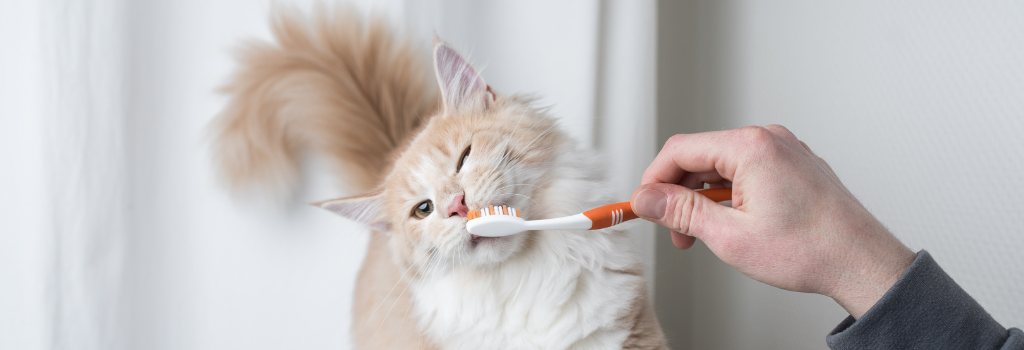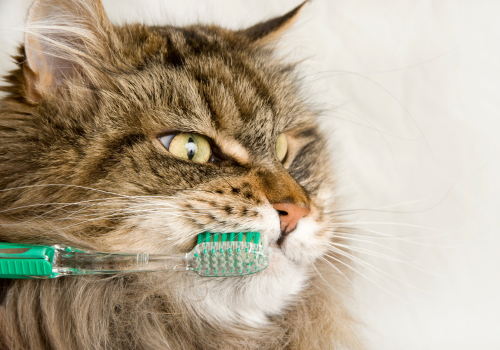Cat dentistry is something that veterinarians wish was more widely discussed, and the benefits of preventive care for the sake of your precious pet are touted. As you’ve turned to the internet for answers, you’ve proven that you want to be the best cat parent you can be, and we’re glad you found us. At Glen Oak Dog & Cat Hospital, we work extremely hard to get you the accurate information you need to keep your cat healthy. There is a lot of information out there about caring for your cat's dental needs, and you may not know where to turn for the best advice. That’s why we’ve taken the most frequently asked questions about cat dentistry and answered them thoroughly and accurately so that your furry feline can hopefully live a long, pain-free life by your side.
If you’re looking for a highly trained veterinarian in Glenview, IL, we’d love to help you care for your cat and any other pets that you have. The first order of business is to get your cat in for their dental exam to ensure they don’t have any potentially harmful disease hiding in their mouth, so please call us right away at (276) 600-2631.
What is involved in cat dental care?
Cat dental care encompasses a broad spectrum of treatments, starting with a basic physical exam to uncover any problems. If there are dental issues, we follow up with a thorough dental cleaning that features scaling, polishing, fluoride treatments, and extractions if that would be necessary.
How does dental health impact the overall health and well-being of my cat?
Good dental health impacts overall cat health in much the same way that it does with humans. The teeth affect everything that goes on inside the body. If the teeth are infected and gums are inflamed, that will have an impact on their appetite and how well they eat. The bacteria that form on the surface of the teeth can get into the bloodstream and affect things like the heart, heart valves, kidneys, and liver. In sum, an infected mouth can negatively impact all organs in the cat's body.
Cats are also very good at hiding pain and discomfort. When cats have dental disease, a bad tooth, gingivitis, or any sort of mouth pain, it can be hard to detect that. Pain affects their overall quality of life. Cats with a painful mouth will often hide it until it's gotten to the point where they can't hide it any longer.

What types of dental care should I be giving my cat at home?
There are special toothbrushes that you can buy and tiny finger brushes that you can put on the tip of your finger with cat toothpaste that you should ideally start using when they are kittens. You can find these products online, at the pet store, or often at the clinic. As veterinarians, we understand that the thought of brushing your cat's teeth sounds strange, but if you start when they're a kitten and get them used to having their teeth brushed, that's quite beneficial. Any amount of brushing you can do, even if it's just once or twice a week, is helpful. Ideally, it would be every day, but we know that’s not completely realistic.
Lastly, a good dental or well-balanced diet can be a simple way to help your cat in this regard, too. Feeding your cat a dental-approved diet that offers those same effects can be highly beneficial, especially since cats obviously eat every day, so talk to your veterinarian about what this entails.
Because cats can be finicky about treats and their food, the most significant thing we recommend for all cats is a dental cleaning every year at the vet hospital with general anesthesia and x-rays to stay on top of things that may be occurring in the mouth.
What are some signs and symptoms of issues with oral health in my cat?
Sometimes you'll see a kitty favoring a part of their mouth, so they're chewing and holding their head to one side. Sometimes they drop food and, other times, they don't want to eat at all. And if you have a friendly kitty at home that will let you look, you might notice that their gums seem red or inflamed.

Some other common signs of oral health issues in cats are:
- Drooling, and sometimes the drool can have some blood tinge to it
- Cats can also sometimes have a puffy mouth if there's inflammation or gingivitis
- Cats might paw at their face if they have a painful tooth
- Excessive grooming
- Halitosis (bad breath odor)
If the oral health issues are serious, the cat may also experience vomiting and/or diarrhea. And then, if it goes on long enough and we don't pick up on some of those more subtle symptoms, we can even see things like weight loss occur. Various stages of tartar/periodontal disease can also gradually take place. And while this doesn't have to do with teeth, per se, cats can also get tumors and growths. Whether these tumors are malignant or benign can affect the mouth or gingival tissue.
How do veterinarians diagnose dental problems in cats?
The first thing we do is a complete physical exam. You schedule an appointment for your cat and we look in the mouth during the exam and look for signs of dental disease or gingivitis. If there's any indication during a physical exam that we have a bad tooth or there's something abnormal in the mouth, then we move on to making an estimate for you for general anethesia for a full dental cleaning.
Most veterinarians will do full x-rays of the mouth for any dental procedure because the dental disease in cats is often below the gumline. So we need to take x-rays to see the roots of the teeth. Based on what we find during the procedure and during the dental cleaning and x-rays, we call and discuss if any extractions may be indicated and go from there based on the complete picture.
What are some possible conditions caused by poor cat dental health, and what are the treatments?
Gingivitis is something that cats can experience, but they can also get what are essentially cavities called resorptive lesions. This is a condition in which the cat’s body reabsorbs the root of the teeth and the enamel wears away. They’re very painful and difficult to diagnose, which is why dental x-rays are beneficial. In cats with really infected mouths, we can run into kidney infections or kidney disease, liver disease, and complications with the heart. Bacterial shedding from the mouth into the body can affect all other organs, which is why we recommend doing routine blood work before we go into any anesthetic procedure. In general, the conditions caused by poor dental care are pain and poor quality of life for your cat.
Treatments vary based on what you find—gingivitis, periodontal disease, loose teeth, and sore or swollen gums are common problems we find during cat dental exams. Some of the more severe things are broken teeth. Veterinarians treat gingivitis and tartar buildup with a simple dental cleaning. The aforementioned resorptive lesions, or broken teeth, often have to be extracted. So the treatment depends on the diagnosis.
If you still have questions about the importance of cat dentistry or if your cat is due for a dental exam, please don’t hesitate to call us at (276) 600-2631 or email us at [email protected].

